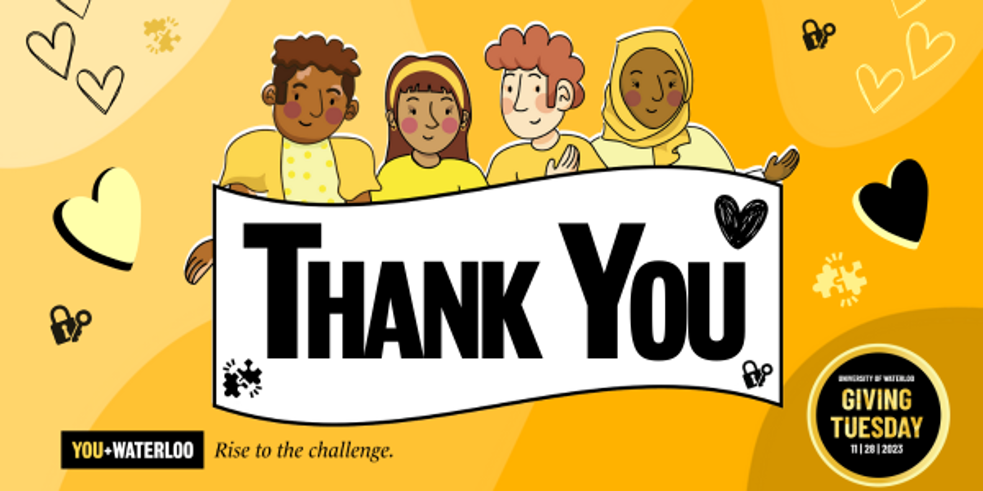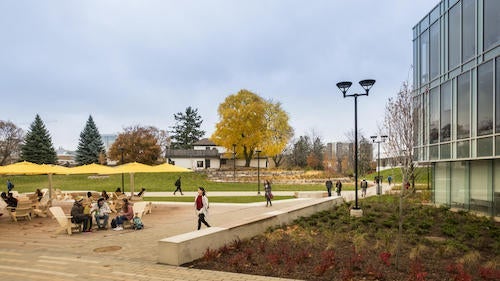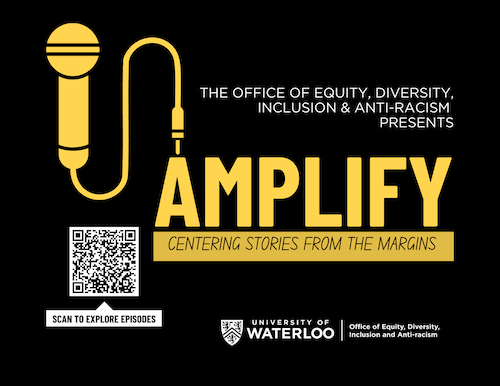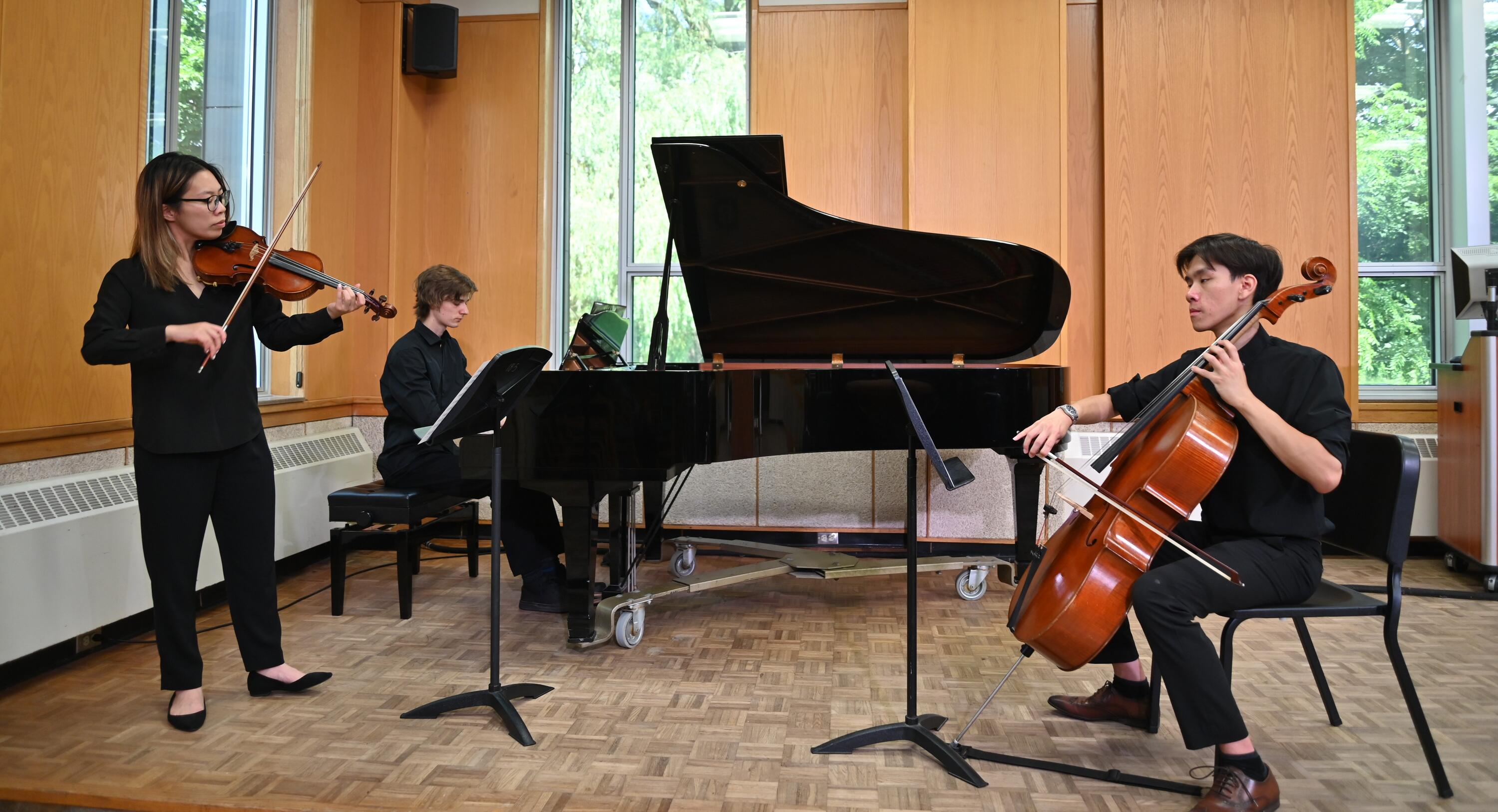- Thank you for making Giving Tuesday a massive success
- Empowering growth for Waterloo staff
- Employee Engagement Survey deadline extended to December 8
- Twente and Waterloo announce winners of their joint Strategic Collaboration Grants
- Amplify: centering stories from the margins
- December's first gift of notes
Editor:
Brandon Sweet
University Communications
bulletin@uwaterloo.ca
Thank you for making Giving Tuesday a massive success

A note from the Office of Advancement.
During our 2023 UWaterloo Giving Tuesday Campaign, almost 1,700 supporters donated over $700,000! This is a remarkable result that we could not have achieved without you. Thank you for empowering our students and faculty to find the solutions needed for our future through your generous support.
Giving Tuesday highlights:
- Most Donors Top Up: 274 donors made a gift to the Waterloo Eye Institute, unlocking an additional $5,000!
- Most Dollars Raised Top Up: $129,113 was raised for the Waterloo Eye Institute, unlocking an additional $5,000.
- Global Challenge: Because Waterloo supporters in 13 different countries made a Giving Tuesday gift, an extra $3,825 was unlocked for the Student Wellness Fund.
Of the total raised, $146,525 was generously donated by our Challenge Champions. Thank you!
You can see all the results on our Giving Tuesday website and watch this short video message of gratitude from some delighted UWaterloo students! Thank you to everyone for bringing joy to our campus community, not just on Giving Tuesday, but all year round.
Empowering growth for Waterloo staff

By Valerie Vaz. This is an excerpt of an article that originally ran on Waterloo News.
The Fall 2023 offering of the Cultivating Talent: A Mentorship Collective program brought staff together from across the University of Waterloo, for an immersive experience, that focused on personal and professional growth. As a component of the President’s Anti-racism Taskforce, the initiative actively encouraged the involvement of Black, Indigenous and racialized employees across campus.
The five-day initiative was co-organized and hosted by Human Resources, in collaboration with the Office of Equity, Diversity, Inclusion and Anti-Racism (EDI-R), and the Office of Indigenous Relations (OIR). During this period, participants engaged in experiences that allowed them to explore self-reflection, peer mentorship, decolonization, anti-racism praxis, networking and relationship building.
At the core of the program was the mission of cultivating relationships across the University, facilitating personal and professional development while promoting a sense of support and belonging.
Read the rest of the article on Waterloo News.
Employee Engagement Survey deadline extended to December 8
A message from Human Resources.
A couple of weeks ago, employees received an invitation to complete the Employee Engagement Survey in their UWaterloo email from the University’s survey partner, Korn Ferry. The participation rate is currently at 44 percent, and we thank you to those who have completed the survey and provided your thoughts. To accommodate timing with the end of classes and capture the feedback of those who have not yet had the time or opportunity, the survey period has been extended to December 8. We encourage you to participate in this important initiative - your voice matters.
Look for your personal survey link from KF Surveys Canada in your inbox. Reminders to those who haven’t completed the survey are being sent on Monday. If you cannot find the survey, please check your junk folder.
All individual responses are kept strictly confidential by Korn Ferry, and only aggregate results will be provided back to the University of Waterloo. Your candid feedback is essential for the University to improve our work culture and environment and will be used to create both departmental and institutional action plans. Departmental and university-wide themes of the survey results will be shared with your unit.
Your voice matters. Take an active role in improving your workplace and complete the survey.
If you would like to learn more, please visit the Employee Engagement Survey website, or contact HRhelp@uwaterloo.ca if you have questions about the survey or require the survey in an alternate format.
Twente and Waterloo announce winners of their joint Strategic Collaboration Grants
A message from Waterloo International.
The University of Twente, located in the Netherlands, and University of Waterloo are thrilled to announce the four research projects receiving funding through the Twente/Waterloo Strategic Collaboration Grants (SCG), which is led by Waterloo International. There were 19 complete applications submitted by researchers, bringing together over 50 colleagues in the process.
Subject matter experts from the four research areas of bioengineering & biotechnology, health, nanotechnology, and water at each institution collaborated to carefully weigh the applications based on a framework that considers the following:
- How closely does the project show potential impact upon each university’s strategic priorities – namely, the University of Twente’s Shaping 2030 and the University of Waterloo’s Global Futures, Strategic Plan 2020-2025, and Waterloo at 100?
- How feasible and realistic are the prospects for stated impact that the project anticipates achieving?
- What are the prospects for continued impact beyond the funding timeframe (including prospects for subsequent external funding)?
Eight awards of up to CAD $16,000/€11,000 have been awarded in pairs, with Twente and Waterloo each providing their side of the joint collaborative teams an award.
At Waterloo, the SCG fund has brought together diverse proposals from all six faculties and a number of institutes. Our Strategic Plan strives to provide direction in developing talent for a complex future; advancing research for global impact; and strengthening sustainable and diverse communities. The funded projects build upon these objectives and those of our partner’s strategic aims.
Please refer to the table below for details and join us in congratulating the successful project leaders!
|
Research Area |
Project submission |
Principle Investigators |
Institution |
|
Bioengineering & Biotechnology |
Engineering Science of Ultrasound-Mediated Drug Delivery: From Bubbles to Biophysics |
Dr. Alfred Yu |
Waterloo |
|
Dr. Tim Segers |
Twente |
||
|
Health |
Remote health monitoring enabled by integrating radar sensing and radio communication networks |
Prof. George Shaker |
Waterloo |
|
Prof. Alex Wong |
Waterloo |
||
|
Dr. Yang Miao |
Twente |
||
|
Prof. dr.ir. André Kokkeler |
Twente |
||
|
Nanotechnology |
Intrinsic Charge Transport Characteristics of Individual Polymer Chains |
Prof. Yuning Li |
Waterloo |
|
Prof. dr. Serge Lemay |
Twente |
||
|
Water |
Nature-based engineering solutions for high latitude sandy coastlines under climate change |
Prof. dr. Chris Houser |
Waterloo |
|
Prof. dr. Kathelijne Wijnberg |
Twente |
More detailed information about the SCG projects can be found on Waterloo International’s webpage for the Twente/Waterloo SCG announcement.
Waterloo International encourages continued collaborative activities with the University of Twente. If you are interested in building a relationship with your colleagues at Twente, please connect with Eric Jardin, International Relations Manager (Europe) at ejardin@uwaterloo.ca for Waterloo, and Margriet Dekkers, International Strategic Partnership Coordinator at m.a.h.dekkers@utwente.nl for Twente, either would be happy to assist you.
Amplify: centering stories from the margins

A message from the Office of Equity, Diversity, Inclusion and Anti-Racism (EDI-R).
Our academic landscape is filled with many diverse narratives of students facing obstacles and adversities while completing their education at UWaterloo. The Office of Equity, Diversity, Inclusion and Anti-Racism (EDI-R) has created a platform to elevate these stories and pave the way for a more inclusive and empathetic understanding of the university experience.
Amplify: Centering Stories from the Margins" — is an empowering podcast that reminds us to refocus on the voices of UWaterloo students who are members of marginalized communities.
With each episode, you’ll hear how students have navigated systemic barriers while navigating societal expectations. Our guests will candidly discuss the adversities they've encountered and, illuminate the strategies and supports that guided them through these important moments.
This podcast strives to create a space where all students feel seen, heard, and validated as they contribute to a broader dialogue on equity by promoting awareness and encouraging understanding.
Tune in to "Amplify" as we embark on a transformative journey, one conversation at a time.
December's first gift of notes
Information Systems & Technology (IST) has published the latest entry in the Atlassian blog series entitled Atlassian updates: Coming soon in Confluence. Give it a read today!
The PACS Society Make a Difference Holiday Market takes place this Saturday, December 2, from 10:00 a.m. to 4:00 p.m. at Conrad Grebel University College. The Make a Difference (MAD) Market is a one-day artisan and craft holiday market hosted by the Peace and Conflict Studies Society, and all funds collected from participating vendors, the silent auction, and the suggested $2 entry contribution will be donated to A Better Tent City.

Also this weekend are a number of end-of-term concerts: Jazz Ensemble: Jazz on a Sunday Afternoon takes place on Sunday, December 3 at 2:00 p.m. in Conrad Grebel Great Hall, and a show featuring Instrumental Chamber Ensembles will happen Sunday at 7:00 p.m. in Conrad Grebel's Chapel, with four different chamber groups play a selection of classical and classical-inspired pieces.
Finally, the Spiritus Ensemble, conducted by Ken Hull, Professor Emeritus at Conrad Grebel University College, performs Handel's Messiah on Sunday, December 3, at 3:00 p.m. at St. John the Evangelist Anglican Church in Kitchener. Tickets are available at www.spiritusensemble.com.
Beyond the Bulletin episode 164

The latest episode of the Beyond the Bulletin podcast is now live. Dr. Suzanne Kearns, aviation professor and director of the Waterloo Centre for Sustainable Aeronautics discusses the ways that interdisciplinary research and learning in sustainable aeronautics can benefit industry, people and the planet. Nominations are open for teaching excellence awards. The deadline for filling out the Employee Engagement Survey has been extended.
Upcoming office closure
The Office of Indigenous Relations will be closed for the week of December 4 (December 4 to December 8) for construction being done in the office. All staff will be working remotely and are available by email.
Link of the day
When and Where
Warriors Game Day Tickets: Season Passes, Black and Gold Alumni Passes and Single Game Tickets now available for the 2023-24 varsity season. Purchase your tickets today!
The Student Health Pharmacy (located in the lower level of the Student Life Centre) is offering flu shots with no appointments needed daily from 9:30 a.m. to 3:30 p.m. Call 519-746-4500 or extension 33784 for more info. COVID shots will be available beginning October 23. You can register online at studenthealthpharmacy.ca.
Disability Decolonized: Keynote Presentation by Dr. Rheanna Robinson, Friday, December, 1, 11:00 a.m. to 12:30 p.m., Fed Hall and online.
PACS Society Make a Difference Holiday Market, Saturday, December 2, 10:00 a.m. to 4:00 p.m., Conrad Grebel University College.
Jazz Ensemble: Jazz on a Sunday Afternoon, Sunday, December 3, 2:00 p.m., Conrad Grebel Great Hall, free admission.
Spiritus Ensemble, conducted by Ken Hull, Professor Emeritus at Conrad Grebel University College, performs Handel's Messiah, Sunday, December 3, 3:00 p.m., St. John the Evangelist Anglican Church, Kitchener. Tickets available at www.spiritusensemble.com
Instrumental Chamber Ensembles, Sunday, December 3, 7:00 p.m., Conrad Grebel Chapel, free admission.
Classes and lectures end, Tuesday, December 5.
Research Talks: Societal health impacts of rising inflation and interest rates, a public event and panel discussion. Tuesday, December 5, 6:00 to 8:00 p.m. (doors open at 5:30 p.m.) at the Apollo Cinema, Kitchener. Registration is required to attend.
9th Annual Conference on Vision and Intelligent Systems, Tuesday, December 5 and Wednesday, December 6, 9:00 a.m. to 4:30 p.m., Day 1 E7 2357, Day 2 DC 1301.
Pre-examination study days, Wednesday, December 6 and Thursday, December 7.
WatITis 2023 Conference, Wednesday, December 6, 8:30 a.m. to 5:00 p.m., Science Teaching Complex.
National Day of Remembrance and Action on Violence Against Women ceremony, Wednesday, December 6, 10:30 a.m. to 11:00 a.m., Engineering 7 2nd floor event space. Registration link.
Workshop: History and Culture Through Traditional Games, Thursday, December 7, 11:00 a.m. to 12 noon.
Engineering and SVPRO present Active Bystander Intervention Training | Engineering Wellness Program, Thursday, December 7, 2:00 p.m. to 4:00 p.m., Engineering 7 (exact location provided upon registration).
16 Days of Activism Against Gender-Based Violence SVPRO Booth, Thursday, December 7, 1:00 p.m. to 4:00 p.m., Student Life Centre main atrium.
Warriors Figure Skating End-of-Term Showcase, Thursday, December 7, 7:00 p.m., Columbia Icefield Rink.
Final examination period, Friday, December 8 to Thursday, December 21.
Retirement Open House for Scott Nicoll, Friday, December 8, 3:00 p.m. to 5:00 p.m., SLC Black & Gold room. RSVP by Friday, November 24 to Amy Bender, albender@uwaterloo.ca.
Staff Salary Discussions Town Hall Meeting, Monday, December 11, 12:30 p.m. to 1:50 p.m., AL 116 and online.
TQT Quantum Opportunities and Showcase 2023, Thursday, December 14, 12 noon to 3:30 p.m., RAC 2.
NEW - Upcoming Quest scheduled maintenance, Saturday, December 16, 4:45 a.m. to 11:00 a.m. and Sunday, December 17 , 6:45 a.m. to 11:00 a.m. Quest will be down and unavailable during this maintenance window.
When and Where to get support
Check out the support listings for faculty, staff and students.
PhD oral defences
History. Rebecca MacAlpine, "In Protection of No Woman: Consent, Illegitimacy, and Gender-Based Violence in Early Modern Somerset, 1600-1699." Supervisor, Dr. Ian Milligan. Available upon request from the Faculty of Arts, Graduate Studies and Research Officer. Oral defence Wednesday, December 13, 9:30 a.m., PAS 2464 and hybrid.
Psychology. Emily Britton, "The Uncertainty Model of Boredom and Self-Control Failure: How Ambient Uncertainty Influences Affect and Behaviour during Unrelated Goal Pursuit." Supervisor, Dr. Ian McGregor. Available upon request from the Faculty of Arts, Graduate Studies and Research Officer. Oral defence Wednesday, December 13, 1:30 p.m., PAS 3026.
School of Public Health Sciences. Kiran Saqib, "COVID-19, Mental Health, and Chronic Illnesses: A Syndemic Perspective." Supervisor. Dr. Zahid Butt. Email Health Graduate Administration for a copy. Oral defence Wednesday, December 13, 1:00 p.m., EXP 1686.
Geography and Environmental Management. Emily Shantz, “Exploring the biopsychosocial landscape of chronic illness: A case study of systemic lupus erythematosus (SLE) from epigenetics to education.” Supervisor, Dr. Susan Elliott. Available upon request from the Faculty of Environment, Administrator, Graduate Studies. Oral defence Friday, December 15, 10:00 a.m.